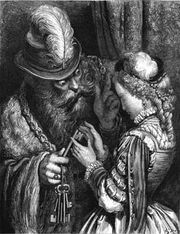
I promised you Bluebeard’s Castle, didn’t I? I didn’t really intend to write about it, but I listened to this one-act opera of Bartok’s last night for the first time in many years and felt like saying something about it.
It’s an early piece of Bartok’s, written around 1910 or so, and is loosely based on an old fairy tale by Charles Perrault, Bluebeard, which concerns a murderous villain and his new young wife. He brings her home soon after they are married and forbids her to open a particular door in his castle, but of course gives her the key anyway, so…she opens it! And finds the dead bodies of his previous wives hanging on the walls. He finds out what she's done and chases her, intending to kill her, but she is rescued in the end by her brothers. A happy ending, I suppose, to a gruesome story.
Bartok’s story is similar – Bluebeard brings his wife home, where she sees there are seven locked doors. She is curious, but Bluebeard tells her they must not be opened, and makes a foreboding reference to ‘rumours’ about him. But she can’t let it go, and persuades Bluebeard to give her the keys to each room, and she opens them one by one. In the first we have a torture chamber, in the second an armory, the third, gold and jewels, the fourth, a beautiful garden, the fifth, grand vistas of Bluebeard’s lands, the sixth, a glittering fountain, and in the seventh…Bluebeard’s three former wives, but not really dead. They are living, and move about, but they don’t seem all that talkative (there are only two singing parts to the opera, Bluebeard and his wife, Judith).
What I find interesting is Bartok’s use of this story as an analogy, more or less, for a classic battle of the sexes. Though on the surface, (and clearly in the original folk tale), Judith is the heroine, Bartok’s point of view seems particularly sympathetic to Bluebeard. (Disclaimer: this is not just my own psychoanalysis; some of these thoughts were sparked by the liner notes, particularly the conductor Istvan Kertesz’s comments.) In fact, one can almost look at the story from a comical standpoint, as if it’s a modern sitcom. The guy, who just wants to love his wife and have her love him, but doesn’t really want to share too much or expose himself. He knows there are things buried in him (and in all men) which are not attractive. But his wife can’t leave him alone, she keeps pestering him to open up, which he reluctantly does, and eventually she drags out of him more than she can bear to know, and of course things end badly after that.
Now, I don’t want to analyze this too far; on the surface of things Bluebeard is a villain, and one certainly wouldn’t want to defend his crimes too much. But everything that is depicted falls very easily into metaphors for the life of a man and his relationship with the women he’s been close to, and Mr. Kertesz makes a very compelling, concise point: he says about Judith “She doesn’t want him, she just wants to open his doors.”
This brings up a lot of interest thoughts regarding relationships. All of us, I think, and maybe especially men?, have things in us which we don’t want to share, can’t share, ugly things, embarrassing things. In an ideal relationship we share as much as we can of ourselves, and are allowed to be ourselves as much as possible instead of playacting some other person, but still…there are some things better hidden, and finding that compromise with people you truly care about can be challenging. I don’t mean that we’re hiding violent crimes (in most cases) but we all put on at least slightly different faces when we are interacting with people than when we are alone, and often different faces for the different people we see. Or maybe it’s just me? It would be interesting to get a woman’s take on this story.
Regarding the music, it’s wonderful. Not yet in Bartok’s mature idiom, it has echoes of Strauss and Mahler, with a strong stamp of Bartok’s own developing personality, but it is very evocative and imaginative. The structure of the story is perfect for a series of small tone-paintings, as Judith opens each successive door to see something different. The garden brings forth a dense yet vibrant tapestry of verdant growth and birdsong, the grand vistas of Bluebeard’s estates ring with magisterial, swelling brass figures that seem to look across to the horizon, the fountain brings serene, drifting notes. When Judith becomes jealous and begins to ask Bluebeard about his former wives, you can hear a note of madness creep into her voice as she sings a thin monotone backed by dissonant strings edging against her notes.
And best of all, this is a short opera, about one hour long, and I was able to listen to the whole thing without falling asleep or letting my attention drift away!
No comments:
Post a Comment